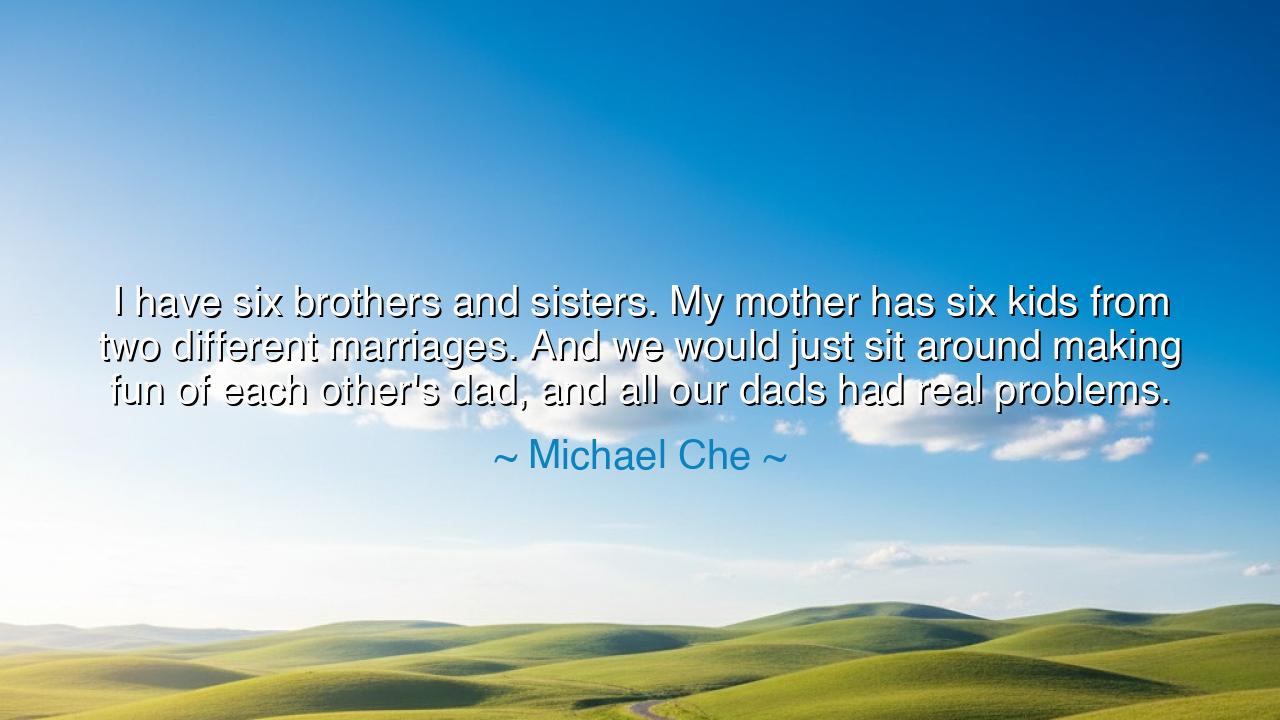
I have six brothers and sisters. My mother has six kids from two
I have six brothers and sisters. My mother has six kids from two different marriages. And we would just sit around making fun of each other's dad, and all our dads had real problems.






"I have six brothers and sisters. My mother has six kids from two different marriages. And we would just sit around making fun of each other's dad, and all our dads had real problems." — Michael Che
There is in these words of Michael Che the sound of laughter that carries both sorrow and strength. It is the laughter of those who have lived through imperfection, who have seen the fractures in their family and yet found light between them. When Che speaks of his brothers and sisters, of his mother with her six children and the fathers with real problems, he is not merely describing a home—he is describing the human condition. For who among us is born into perfection? Who among us has not sat among the broken pieces of life and chosen to laugh, lest we crumble beneath the weight of what is too heavy to bear?
The ancients understood this: that laughter born of hardship is not mockery, but medicine. When a family gathers and turns their pain into jest, they perform a sacred ritual older than time. They acknowledge the flaws of their world, not with bitterness, but with understanding. The real problems of the fathers—their failings, their wounds, their human weakness—become less of a curse when spoken aloud in humor. In those moments, the children inherit not their fathers’ despair, but their resilience. They learn that even brokenness can be met with grace.
This, then, is a truth hidden in Che’s simple recollection: that love can exist even amidst chaos, and that laughter can be an act of defiance against despair. When we laugh at the pain that once ruled us, we are no longer its servants. To jest about the past is to declare, “You no longer hold power over me.” Thus, the humor of a struggling family becomes its shield and its sword. It binds siblings together and transforms tears into shared memory. It is not the absence of pain, but the mastery of it.
Think of Viktor Frankl, who survived the horrors of the concentration camps. Amid starvation and cruelty, he found that humor—small, absurd moments of laughter shared among prisoners—helped preserve the soul. He wrote that even in the darkest abyss, man may find a flicker of freedom: the choice to laugh, to find meaning, to rise inwardly above the ruins. In the same way, Michael Che’s family, though surrounded by hardship, found a way to live in light. Their laughter was not denial, but resilience—a proof that the human spirit can find joy even when life itself seems unkind.
And yet, beneath the laughter, there is tenderness. When Che says, “All our dads had real problems,” he is not casting judgment but compassion. There is recognition that the fathers, too, were human—fragile, flawed, and perhaps fighting battles unseen. In laughter, the children forgave what they could not change. They did not glorify pain, but they refused to be broken by it. Their humor was an act of healing, a way to make peace with imperfection.
Let us then learn from this. In every family, there are fractures—between parent and child, between past and present. Some wounds will never be undone. But if we can sit together, as Che and his siblings did, and find the courage to laugh—not cruelly, but lovingly—we may begin to heal. The laughter of understanding softens the hardest heart. It reminds us that love does not require perfection; it only asks for patience and forgiveness.
So, my child of tomorrow, remember this teaching: turn pain into laughter, and laughter into love. Do not hide from the broken stories of your family, for they are the forge in which your compassion is made. When you face hardship, do not curse it—face it with humor, with humility, and with hope. For as Michael Che’s story shows us, even amid real problems, there can be real love—and from that love, the strength to endure, to forgive, and to shine brighter than before.






AAdministratorAdministrator
Welcome, honored guests. Please leave a comment, we will respond soon